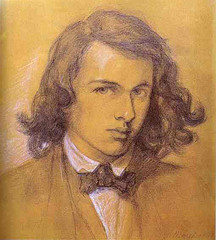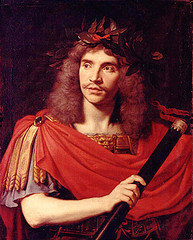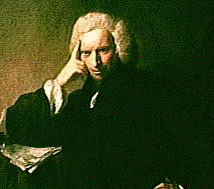An admirer once wrote to Rudyard Kipling: “I see you get a dollar a word for your writing. I enclose a check for one dollar. Please send me a sample.”
Kipling responded: “Thanks.”
An admirer once wrote to Rudyard Kipling: “I see you get a dollar a word for your writing. I enclose a check for one dollar. Please send me a sample.”
Kipling responded: “Thanks.”

Dante Gabriel Rossetti revered his wife, and when she died in 1862 he laid his journal in her coffin.
Seven years later he decided he needed the poems, so he had her exhumed.
According to Oliver Goldsmith, Thomas Parnell once overheard Alexander Pope reading a draft of The Rape of the Lock to Jonathan Swift, memorized the description of the Toilet, and translated it into monkish Latin. The next day he confronted Pope with the counterfeit verse and accused him of plagiarism, “and it was not till after some time that Pope was delivered from the confusion which it at first produced.”
Also: “Mr. Harte told me that Dryden had been imposed on by a similar little stratagem. One of his friends translated into Latin verse, printed, and pasted on the bottom of an old hat-box, that celebrated passage, ‘To die is landing on some silent shore,’ &c. and that Dryden, on opening the box, was alarmed and amazed.”
During World War II, Evelyn Waugh served as a war correspondent in Ethiopia. One day his editor asked him to investigate a rumor that an American nurse had been killed in an explosion during an Italian air raid. The cable read:
REQUIRE EARLIEST NAME LIFE STORY PHOTOGRAPH AMERICAN NURSE UPBLOWN.
Waugh found that the rumor was false, so he wired back:
NURSE UNUPBLOWN.
This is the opening of Chapter 4 of Mark Twain’s A Double Barrelled Detective Story:
It was a crisp and spicy morning in early October. The lilacs and laburnums, lit with the glory-fires of autumn, hung burning and flashing in the upper air, a fairy bridge provided by kind nature for the wingless wild things that have their home in the tree-tops and would visit together; the larch and the pomegranate flung their purple and yellow flames in brilliant broad splashes along the slanting sweep of woodland, the sensuous fragrance of innumerable deciduous flowers rose upon the swooning atmosphere, far in the empty sky a solitary oesophagus slept upon motionless wing; everywhere brooded stillness, serenity, and the peace of God.
Twain later recalled that few readers noticed anything wrong with it.
Plutarch wrote that Homer died of exasperation because he couldn’t solve a fisherman’s riddle:
“What we have caught we threw away; what we could not catch we kept.”
The answer is “fleas.”
“Summer afternoon — summer afternoon; to me those have always been the two most beautiful words in the English language.” — Henry James

How hard, when those who do not wish
To lend–that’s lose–their books,
Are snared by anglers–folks that fish
With literary hooks;
Who call and take some favorite tome,
But never read it through;
They thus complete their sett at home,
By making one of you.
I, of my Spenser quite bereft,
Last winter sore was shaken;
Of Lamb I’ve but a quarter left,
Nor could I save my Bacon.
They picked my Locke, to me far more
Than Bramah’s patent worth;
And now my losses I deplore,
Without a Home on earth.
Even Glover’s works I cannot put
My frozen hands upon;
Though ever since I lost my Foote,
My Bunyan has been gone.
My life is wasting fast away;
I suffer from these shocks;
And though I’ve fixed a lock on Gray,
There’s gray upon my locks.
They still have made me slight returns,
And thus my grief divide;
For oh! they’ve cured me of my Burns,
And eased my Akenside.
But all I think I shall not say,
Nor let my anger burn;
For as they have not found me Gay,
They have not left me Sterne.
“Sir Walter Scott said that some of his friends were bad accountants, but excellent book-keepers.”
— Charles Carroll Bombaugh, Gleanings for the Curious From the Harvest-Fields of Literature, 1890

Molière collapsed on stage in 1673 and died hours later.
The play was called The Hypochondriac.

Lawrence Sterne, after a lifetime of peculiarities, and becoming notorious as an eccentric, curious and able writer, at his death was buried in a graveyard near Tyburn, belonging to the Parish of Mary-le-bone, and the ‘resurrection man’ disinterred his corpse and conveyed it to the professor of anatomy at Cambridge where being laid upon the dissecting table, was at once recognized by one of those present who knew him well while living.
— Bizarre Notes & Queries, February 1886